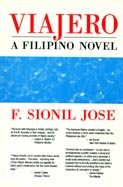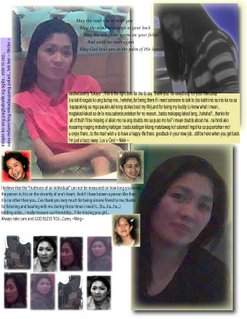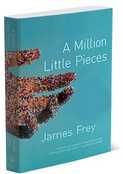I love good books. I devour them (partly because of the fact that I still do not have a television set!). Yet just recently, this one good book consumed me, literally. I thank Mac, my brother, for being the closet-Marxist that he is, for each time that I feel the need to ransack his room for books, his cabinet never fails to surprise me. I read his copy of Tom Clancy’s Red Storm Rising — bored me on most parts but the Russian Maskirovka and the action in Keflavik and the mountains of Iceland made me want to understand the whole thing — and this magnificent book by F. Sionil Jose, Viajero (although Sionil isn’t pro Marx, I think).

To put it simply, Viajero is a story about a boy named Badong from the small barrio of Raza, who was orphaned during the Japanese occupation. He was taken to a secluded area in the mountains by an old man, Apo Tale, who took him as his own. His daughter, the caring Mayang stood as Badong’s mother. Yet, just as his young mind was starting to hope and forget the killings in the plains, a group of Japanese troops reached their mountaintop home and raped her Inay Mayang and killed her and Apo Tale. After his dangerous escape, he was found by an American army, Captain Wack, who later took him to the US, raising him like a real father will do his own son. Badong became “Buddy,” an American citizen who grew up to be a successful scholar and academic. His profession took him to places like Spain, Japan and Guam, among others countries, where he met people who always reminded him of Filipinas, his homeland, its history, and its people — men and women with skin sun-burned as his own. Despite the comforts of his lifestyle and of living in the US, Buddy always felt the burning need to search for himself, to search for home, to belong.
I’m not much of a story-teller and I can’t give justice to this book just by summarizing it. There are twists and turns in the book that every Filipino with a sense of nationalism can relate to. Salvador dela Raza’s soul-searching is nationalistic just as it is personal. It’s also quasi-historical that you can’t help but look at Philippine history and the personalities in it in a different perspective. If there’s anything this book is capable of doing, it is, at the least, to stir something in you and make you perceptive about the current state of our country, our freedom, our ethnicity.
I remember SSC days when TS used to join rallies. I recall telling the Eds that if the issues hit them and they feel that they should get involved, then they should be in the streets. Otherwise, they are better off inside the classroom listening to their profs (of course, it’s always different with the staff as they were ordered to be there if only to cover the story). I’m a self-confessed advocate of freedom of choice and I’ve taken it upon myself to let TS members decide whether issues affect them or not. I taught myself to rationalize that students have to have a valid reason why they should join the rallies and stink of sun and perspiration, instead of staying within the confines of the classroom just as their parents wished them to do… I used to think that except for the undying student concerns about TFI, campus journ and sexual harassment, other issues that most student feds echo were beyond my worries. But rationalization is mostly euphemism for ignorance. Maybe I wasn’t “enlightened” then. Or to put it plainly, maybe I just didn’t believe that they were prepared to sacrifice themselves fighting for their causes, making them be known and be heard. After all, to be called tibak is some sort of a laurel on the head in my time. Yet, had I read this book in college, I’m sure I would have thought of them differently, I probably would have allowed myself to be a convert. Viajero awakened something in me. It provoked me to think and search for answers why oligarchy came to be, why the Cojuangcos, Zobels and Ledesmas, among the few elitist families that benefited from the fruits of feudalism, have thousands of hectares of land while millions of Filipinos squat in their own country, bereft of a piece of land, bereft of dignity. These are questions that I’m sure we’ve asked ourselves once or twice in our occasional hours of reverie.
Is Salvador dela Raza then just a character in Sionil’s novel? Were his quandaries just imagined by his storyteller, was he all purely contrived? Or was he once walked and kissed the soil of Filipinas? Fiction or otherwise, I think Salvador dela Raza is you, me, and each and every Filipino who believes that we are far from being free. Funny but I associate all of this with The Matrix, you know, what we see isn’t what it seems. We may content ourselves with this superficial freedom but we will still remain to be the modern day Indios that we all are because we are not free from poverty, from colonial mentality, from class biases, and most of all, from the ills of centuries and centuries of dissent among us, Filipinos, making us what we are right now — miserably divided, brown against brown.
It’s been generations of decay since Filipinas was first colonized and there’s no denying that we have inherited and fostered the worst of colonial mentality and vices. The affluent Filipino-Spanish mestizo families today still have the poorest farmers tilling their haciendas. Rural farmers who were able to grow their own crops on rented land , who cannot afford to go the market themselves are betrayed by Filipino middlemen who buy their crops at unfairly low prices and sell them in the market ten times, twenty times the price they paid them. Remnants of racism exist among us, for why else would we use whitening soap if we feel comfortable wearing our own skin?
I’d like to hope that there’s still a way to redeem ourselves and atone for what we have all become. They say that we cannot forever keep on cutting wild grass. To permanently secure our view of the horizon, we must uproot the grass one by one, for it is from the roots that the blades are nourished. It sounds wise, and it’s true and I believe so. But I don’t think this means that we need to overthrow the powers that be nor call for another armed revolution to turn the wheels of parity and progress. I do not believe in armed revolution myself, for this country had had too much bloodshed. Imagine, the Philippines had unceasingly been drenched in its own people’s blood since Lapu-Lapu up to the present reign of Gloria Arroyo, yet it rarely changed anything, if at all. Their blood bathed our land but it did not give land to the landless and certainly, it did not buy back our freedom. Adding another ounce of it when our soils have long been encrusted in crimson would be a waste and it will be unnecessary to die in vain just like all the martyrs we know. They may have tried to change the course of our future but we only have to look around to know that, sadly, they failed and we too, are failing them. We could have continued on with what they started but we never did, and we thought that it’s best that we just call them heroes in the history books and commemorate them and their valor, and just cease from there and embrace the decay. It’s sad, even mortifying, that for a country that was once the seat of envied nationalism, we are divided to bits with no clear sense direction and worse, no clear sense of what we have all become — for brown as we all are, we have become our own version of the colonialist and imperialist of the past and present. Cliché as it may sound, what this country needs is unity and patriotism. I am not wise and I need no one to rub it in, but I just know that if we stop grabbing at each other’s brown neck, and focus on how we can all improve ourselves and our country, then maybe we can influence the future of our children and our children’s children who’ll inherit this land we call home. We have our revolutionary past to remind us of how Filipinas and our heroic people have suffered. That should be more than enough reminder to fire us to continue with the struggle for moral order and a just society. And as it has always been, change starts from within ourselves.










